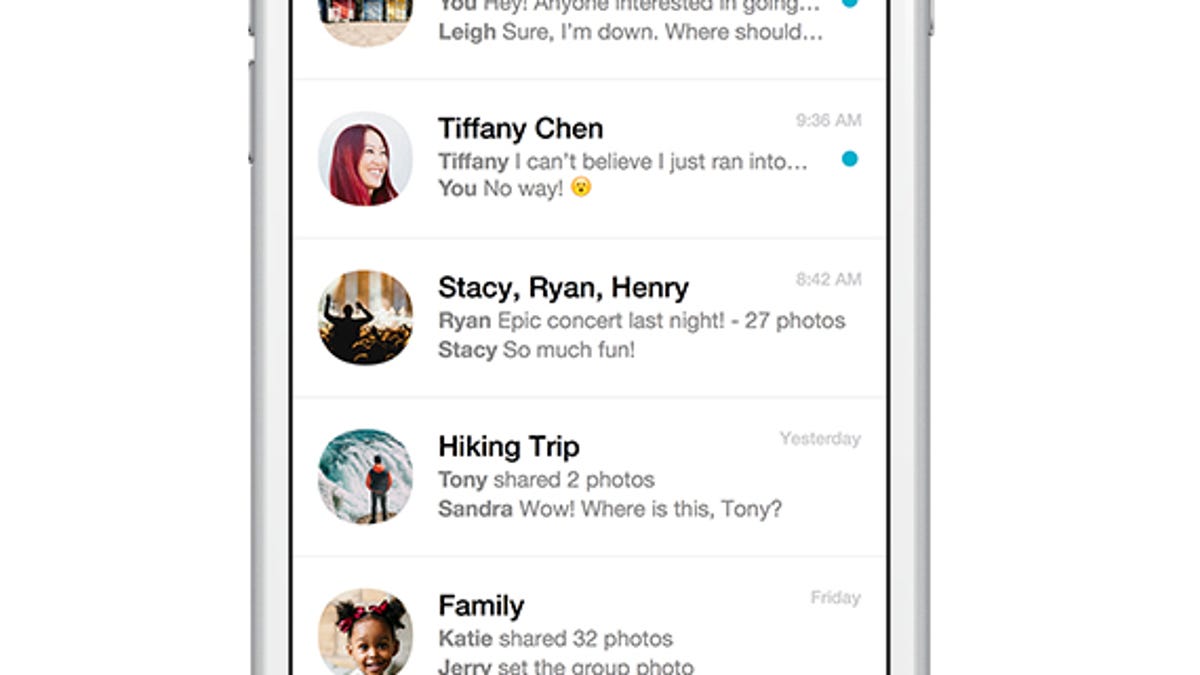Yahoo Messenger wants you back
Yahoo is revamping its venerable chat service, which was released all the way back in 1998, to try to compete with the likes of newbies Snapchat and Facebook-owned WhatsApp.

Yahoo has revamped Messenger to get "back in touch with the market."
You may know Snapchat, WhatsApp and Google's Gchat. But do you remember Yahoo Messenger?
It's the venerable chat service from the bygone era of buddy lists and screen names, much like AOL's Instant Messenger. Introduced in 1998, Yahoo's service has languished in recent years as new chat apps have drawn buzz. (To be fair, an informal poll at my office shows that Yahoo Messenger still has fervent users.)
Now Yahoo is hoping the service can make a comeback. The Sunnyvale, California, company released a revamped version of the chat service's app on Thursday. It's available on the Web, in Yahoo's email service, on Apple iPhones and on smartphones powered by Google's Android mobile software.
The question is, will you want to use it? Does it do anything you can't already do with one of its rivals? Yahoo thinks the answer is yes because of new features such as the ability to unsend messages. (Drunk texts, ahem.)
The product launch could also be one of the most awkwardly timed in recent memory, though. Earlier this week, news reports citing anonymous sources said that Yahoo is weighing a selloff of its entire Web products and advertising business, presumably because they're beyond saving. Then, along comes a major product revamp -- about a year in the making. A Yahoo spokeswoman declined to comment on the reports.
For Austin Shoemaker, senior director of product management for Yahoo Messenger, the hope is simply to get the app back on track.
"We already have a Yahoo Messenger in the market that we have not been maintaining actively for the last couple of years," Shoemaker said. "This gets us back in touch with the market."
There's good reason for that. Messaging has been a battleground for Silicon Valley companies in recent years. Facebook paid $19 billion last year for WhatsApp, the chat service that has exploded in popularity and that, by the way, was co-founded by former Yahoo employees. Other players like Snapchat, with its ephemeral messaging shtick, have also been a huge hit with teens and young adults.
Yahoo wouldn't specify how many people use Messenger other than to say it is has "millions of users."
Yahoo hopes new features like unsending messages will attract users.
Yahoo is hoping a few key features will lure more users to Messenger.
First, people can now unsend messages at any time. That's a big deal because no other major messaging service lets you do that. Even months after they are sent, you can recall typo-laced messages or photos you regret sending. But the feature could also be a turnoff for people concerned with posterity -- or for bickering couples who can't go back to a reliable transcript after an argument. Shoemaker acknowledges that the feature is a "trade-off."
The updated app is also designed to let you send hundreds of pictures at a time, quickly. That's due to technology Shoemaker developed at Cooliris, the chat startup Yahoo bought last year, bringing him to the company. To speed up the sending process, the service presents you with a low-resolution version of the picture first, then replaces it with a higher-resolution one when downloading is complete.
The revamp will let you "like" individual messages, as you can do on Facebook and Twitter. The app also lets you rapidly find GIFs to add to messages. New video features are coming too, Shoemaker said.
This isn't Yahoo's only attempt at getting messaging back on track. In July, the company introduced Livetext, a chat app that chases the zeitgeist of Snapchat. Livetext lets you videoconference with other people, but with text instead of sound. Shoemaker said Livetext and the new Yahoo Messenger serve different audiences and will coexist, at least for now.

